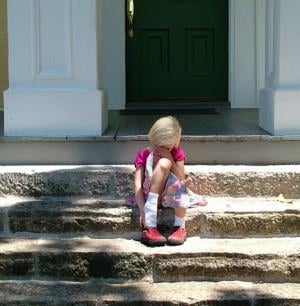
Childhood should be a happy time, yet a growing number of children in South Africa are unhappy, or even depressed. These children, says clinical psychologist, Vanessa Cohen, “feel that they can no longer cope and that they are helpless and out of control.”
“Although there are no official South African statistics for childhood depression, it is common and under diagnosed,” says child and adolescent psychiatrist Dr Brendan Belsham. He believes that genetic and environmental factors play an equal role in contributing towards childhood depression.
In South Africa, we have many environmental stressors including divorce, family conflict, emotional and physical abuse, bullying and peer group problems at school, crime, hijackings, poverty and the impact of AIDS on family life.
Spot depression in children
Symptoms of depression in children are not the same as those of adult depression, although anxious children often present with physical symptoms like stomach aches and headaches and not the appetite or sleep disturbances which typify adult depression. A depressed child could eat and sleep quite normally. However, he may experience nightmares. After puberty, depressive symptoms become more like those in adulthood and one is likely to see decreased or increased appetite, and interrupted or excessive sleep.
According to Dr Belsham, depressed girls tend to be less physically aggressive compared to boys, although they can be just as irritable. In adolescence, teenage girls often present with exaggerated premenstrual symptoms and can also deteriorate behaviourally. They might experiment with smoking, alcohol or drugs, bunk school, or become promiscuous. Therefore any sudden appearance of such symptoms in a previously well-adjusted child should arouse suspicion of an underlying, or masked, depression.
Children don’t sustain a mood the way adults do, and it is unusual for them to stay continuously sad. Even a severely depressed child can sometimes seem cheerful.
Look for changes like irritability, irrational behaviour, aggression, or the child becoming quieter than usual. Also check if there have been behavioural changes at school.
Children normally exhibit symptoms of generalised anxiety before depression sets in. They often worry about things that adults dismiss as unimportant – for example, whether their parents are going to return after going out in the evening, or going away on business. Childhood depression may last for months or even years, and discrete episodes are less clearly discernible than they are in adults.
What to do
When taking action it is important not to focus only on your child’s behaviour. If she is reacting to conflict in your marriage or in your home, or to a stressful situation at school, or with her peers, you need to sort this out as well. Encourage your child to express herself by reflecting her feelings. Also reaffirm that problems between you and your spouse, or other family members, are not her fault and have nothing to do with her. This is a time to ensure that your child feels secure by maintaining the familiar. Stick to limits, structure, routine and boundaries and do not introduce major changes.
Both Dr Belsham and Cohen recommend taking the child for an assessment with a child psychologist, where therapy may be recommended. Between 4 to 10 years of age, play therapy is the norm. From 6, talk therapy can be introduced. Worldwide, research shows that cognitive therapy works particularly well with older children as it helps them to identify destructive and negative thinking and to replace this with positive thoughts that can boost self-esteem and confidence. A good cognitive therapist will also teach an anxious child simple relaxation techniques.
“Be open when you take a child to therapy,” says Cohen. “Tell her that you have noticed something is worrying her and that you are going to a person who helps children to deal with their feelings and worries. Explain that this is a place where whatever you talk about is confidential.”
“Without a trusting relationship, you cannot help a child,” Cohen says. “Try another therapist if your child does not relate easily to the first one. Also remember that even religious leaders or school social workers can help if your child has bonded with them. It’s good to try and foster these relationships.”
For a referral to a child psychologist or a child psychiatrist, speak to your GP, your child’s school, or the SA Depression & Anxiety Group (SADAG) on (011) 884 1797 or (011) 783 1474.




 Publications
Publications
 Partners
Partners










